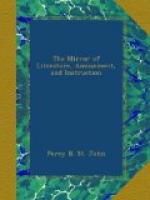He preached a sermon at Lincoln for the benefit of a charity school. In the course of this sermon he related, in familiar but sufficiently dignified language, a story of a man who, giving evidence on a trial respecting some prescriptive right claimed by the trustees of the charity, was browbeaten by the questioning counsel:—“I suppose the fact to which you swear happened when you were a charity boy, and used to go to school there?” The witness calmly replied, “I was a charity boy; and all the good that has befallen me in life has arisen from the education I received at that school.” Paley drew hence an argument in favour of the institution for which he pleaded. The whole discourse pleased his auditors, and a deputation waited on him to request he would print it. “Gentlemen, I thank you for the compliment; but I must give the same answer that I have given on other like occasions; and that answer is—The tap is out.” “The Archbishop of York,” said he, speaking of a late primate, “preached one day at Carlisle; I was present, and felt muzzy and half asleep; when on a sudden I was roused, and began to prick up my ears; and what should I hear but a whole page of one of my own books quoted word for word; and this without the least acknowledgment, though it was a white bear; a passage that is often quoted and well known.” “Now,” said Dr. Milner, Dean of Carlisle, who related the anecdote, “guess what inference Paley drew from this plagiarism. No; if that court were full of people, not one of them would be able to guess: it was this—I suppose the archbishop’s wife makes his grace’s sermons for him.”
* * * * *
The city has always been the province for satire; and the wits of King Charles’s time jested upon nothing else during his whole reign.—Addison.
* * * * *
THE GATHERER.
A snapper up of unconsidered
trifles.
SHAKSPEARE.




